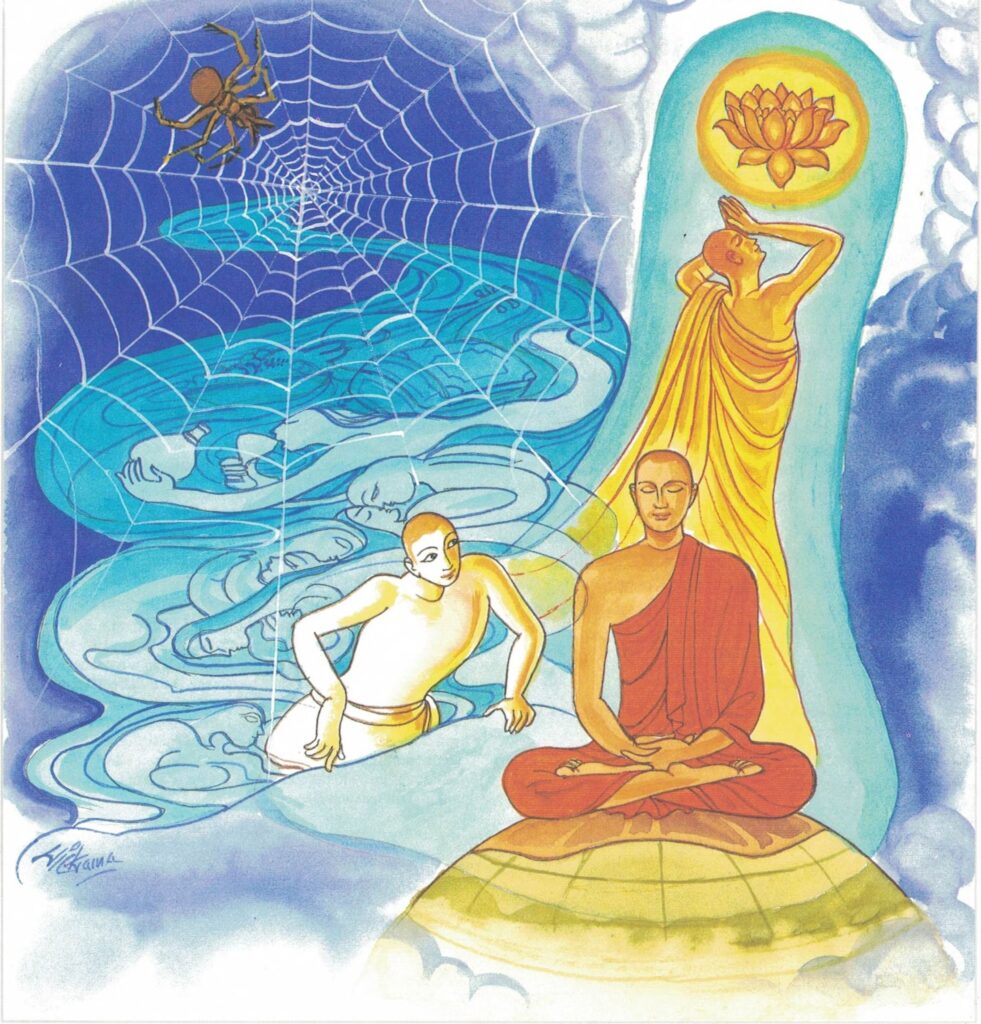Pali text, illustration and English translation of Dhammapada verse 347:
ye rāgarattā’nupatanti sotaṃ sayaṃ kataṃ makkaṭako’va jālaṃ |
etam’pi chetvāna vajanti dhīrā anapekkhino sabbadukkhaṃ pahāya || 347 ||
347. Ensnared in passion back they fall as spider on a self-spun web. This passion severed, wander the wise forsaking dukkha all.

The Story of Theri Khemā
While residing at the Veluvana monastery, the Buddha spoke this verse with reference to Queen Khemā.
Queen Khemā was the chief queen of King Bimbisāra. She was very beautiful and also very proud. The king wanted her to go to the Veluvana Monastery and pay homage to the Buddha. But she had heard that the Buddha always talked disparagingly about beauty and she therefore tried to avoid seeing the Buddha. The king understood her attitude towards the Buddha; he also knew how proud she was of her beauty. So the king ordered his minstrels to sing in praise of the Veluvana monastery, about its pleasant and peaceful atmosphere, etc. Hearing them, Queen Khemā became interested and decided to set out for the Veluvana Monastery.
When Queen Khemā arrived at the monastery, the Buddha was expounding the Dhamma to an audience. By his supernormal power, the Buddha made a very beautiful young lady appear, sitting not far from him, and fanning him. When Queen Khemā came to the audience hall, she alone saw the beautiful young lady. Comparing the exquisite beauty of the young lady to that of her own, Khemā realized that her beauty was much inferior to that of the young lady. As she looked again at the young lady her beauty began to fade gradually. In the end, she saw before her eyes an old decrepit being, which again changed into a corpse, her stinking body being attacked by maggots. At that instant, Queen Khemā realized the impermanence and worthlessness of beauty.
The Buddha knowing the state of her mind remarked, “O’ Khemā! Look carefully at this decaying body which is built around a skeleton of bones and is subject to disease and decay. Look carefully at the body which is thought of so highly by the foolish. Look at the worthlessness of the beauty of this young girl.” After hearing this, Queen Khemā attained sotāpatti fruition.
At the end of the discourse, Queen Khemā attained arahatship and was admitted to the Sangha and became the chief female disciple of the Buddha.
Explanatory Translation (Verse 347)
rāgarattā ye sayaṃ kataṃ jālaṃ makkaṭako iva sotaṃ patanti dhīrā
etaṃ api chetvāna anapekkhino sabbadukkhaṃ pahāya vajanti
rāgarattā: in the heat of passion; ye: they; sayaṃ kataṃ [kata]: made by one’s own self; jālaṃ [jāla]: web; makkaṭako iva: like the spider; sotaṃ [sota]: (into) the stream (of craving); patanti: fall; dhīrā: wise ones; etaṃ api: even this; chetvāna: having cut off; anapekkhino [anapekkhina]: with no yearning (for sensual pleasures); sabbadukkhaṃ pahāya: overcoming all suffering; vajanti: enter Nibbāna
Beings who are infatuated with lust fall back into the stream of craving they have generated, just as a spider does in the web it has spun. The wise, cutting off the bond of craving, walk on resolutely, leaving all ills (dukkha) behind.
Commentary and exegetical material (Verse 347)
makkaṭako va jālaṃ: like the spider’s web, made by itself. The spider follows the various streams (threads) of the web to capture its victims.
anupatanti sotaṃ: Those in the heat of passion, too, follow their selfmade streams of sensual pleasures and fall into these streams.